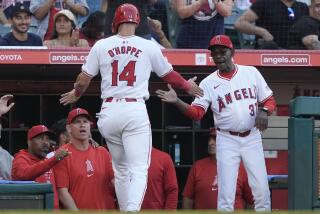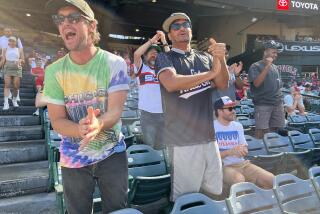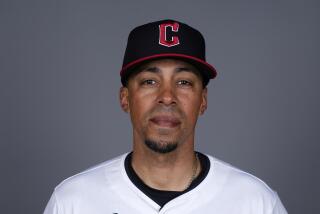Grich Is Closing In on Wrong Side of a Youth Movement
PALM SPRINGS — About six years ago, Bobby Grich got old.
One day the kids asking for autographs stopped calling him Bobby and started calling him Mr. Grich.
Bobby knew that meant one of two things. Either there was an epidemic of juvenile politeness sweeping the country, or he was suddenly old.
Now, Mr. Grich is 36, about to begin his 14th season in the big leagues, and he finds himself getting closer to being on the wrong end of the Angels’ youth movement.
He looks around training camp and he sees a 20-year-old kid named Mark McLemore, the Angel second baseman of the future.
He also sees Angels of the future at first base and third base, and several of them clustered on the pitcher’s mound.
This is an unusual situation here. Until recently, the club policy was that any player reaching 30 was granted tenure, like a college professor, and could play forever if he felt like it.
If a good looking kid came up, like Tom Brunansky or Carney Lansford, he was quickly shipped off to another team. That made the tenured veterans happy, because kids keep messy lockers, play loud music and wear their uniform socks funny. Who needed ‘em?
Then came this youth movement, with such kids as Gary Pettis and Dick Schofield moving into the lineup.
And now there are more talented youngsters in spring training than anyone can remember.
“This is the first time in nine springs I’ve been here that I can look around and see this many good young players,” Grich said. “Usually there are one or two. This spring I’m looking at 9 or 10.”
He’s especially looking at McLemore, a switch-hitter with great speed and glove.
“I was taking ground balls with him the other day in Mesa,” Grich said. “I watched him, and I remembered what you’re supposed to do on ground balls. It was like I was learning from him.
“He refreshed my approach to getting aggressive again. You can get a little lazy. It picked me up.”
If McLemore is a season or two away, Grich can worry about Rob Wilfong, a lad of 31 who could take Grich’s job right now.
“That’s what this team needs, at every position,” Grich said. “I think you’ll see a change in spirit, I really do. I think the older players cannot afford to get lazy, to ride on their laurels.
“I like having competition. I think it’s healthy for everyone concerned. Nothing is worse than to have it made and to try and push yourself.”
Grich says he’ll be happy to help the kid, McLemore, if he asks for advice.
Bobby remembers how it was being a rookie. He broke in with Baltimore in 1970, called up at midseason because he was hitting .383 in Triple-A.
He walked into the Orioles’ clubhouse early in the afternoon. Nobody else was there except Manager Earl Weaver, doing some paper-work in his office. Grich knocked on the skipper’s open door.
“What do you want?” Weaver barked.
“I just wanted to let you know I’m here,” Grich said.
“Is that all?” Weaver growled.
“That’s all,” Grich said.
The next thing Weaver said to Grich was hello, the following spring training.
Grich was 21, the only unmarried Oriole.
“I felt like an outsider looking in,” he said.
The veterans called him Ga-rookie, as in Ga-rich the Ga-rookie, a name Boog Powell hung on him.
“They wouldn’t call you by your name. They wouldn’t let you forget you were a rookie,” Grich said.
Why should they? Here was a kid who was in town to take away someone’s job. What did you expect the veterans to do? Wish him luck?
Powell, though, helped Grich. He introduced him to Baltimore crab cakes and to the car dealer who supplied the players with new cars.
And Oriole second baseman Davey Johnson, who would soon be traded because of Grich, helped the kid.
Now Mr. Grich, who has had a starting job locked up since 1972 when he drove Johnson out of Baltimore, sees a kid in the same spot he was in once.
“He’s quiet, like me when I was breaking in,” Grich said of McLemore. “I remember how it was. I’m going to treat him the same way Davey Johnson treated me. I’ll help him if he asks me.”
Some players reject the theory that the kids, the hot prospects, will inject a fresh spirit in the team by adding a new element of competition.
“We’re all professionals. We’re going to play hard no matter what,” said Doug DeCinces, who has never been accused of less.
“You think Brian Downing is going to play any harder?”
Not and live to tell about it.
Still, who could ignore the kids, most of whom will be sent back to the minors but who will be only a phone call and a quick plane trip away from Anaheim?
Mr. Grich, for one, knows they’re coming soon, and he’s not going to take it lying down.
More to Read
Go beyond the scoreboard
Get the latest on L.A.'s teams in the daily Sports Report newsletter.
You may occasionally receive promotional content from the Los Angeles Times.






